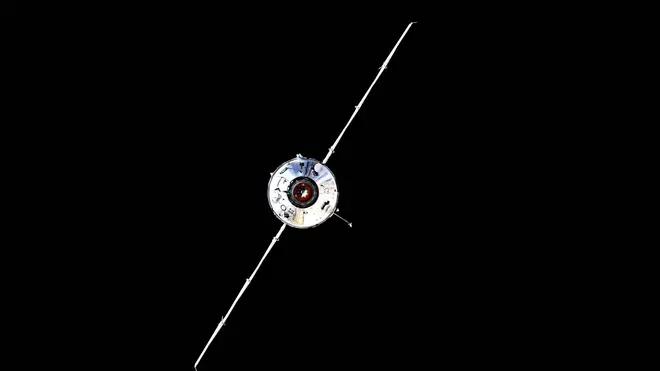
Ian Payne 4am - 7am
30 July 2021, 15:54

The International Space Station lost control of its orientation for 47 minutes on Thursday.
A Russian space official has blamed a software problem on a newly docked science lab that briefly knocked the International Space Station out of position.
The space station lost control of its orientation for 47 minutes on Thursday, when Russia’s Nauka science lab accidentally fired its thrusters a few hours after docking, pushing the orbiting complex from its normal configuration.
The station’s position is key for getting power from solar panels and communications. Communications with ground controllers also blipped out twice for a few minutes.
Vladimir Solovyov, flight director of the space station’s Russian segment, blamed the incident on a “short-term software failure”.

In a statement released by the Russian space agency Roscosmos on Friday, Mr Solovyov said that because of the failure, a direct command to turn on the lab’s engines was mistakenly implemented.
He added that the incident was “quickly countered by the propulsion system” of another Russian component at the station and “at the moment, the station is in its normal orientation” and all its systems “are operating normally”.
Nasa said on Thursday that there was no immediate damage or danger to the crew.
The incident caused Nasa to postpone a repeat test flight for Boeing’s crew capsule that had been set for Friday afternoon from Florida.
It will be Boeing’s second attempt to reach the 250-mile-high (400-km-high) station before putting astronauts on board. Software problems scuppered the first test.
#ICYMI : @NASA and @BoeingSpace have decided to stand down from Friday’s launch attempt of the second Orbital Flight Test (OFT-2) mission.
Currently, the earliest available launch opportunity is 1:20 p.m. ET on Tuesday, Aug. 3. Learn more: https://t.co/iZLcjFbwmM pic.twitter.com/m177ewDXat
— NASA Commercial Crew (@Commercial_Crew) July 29, 2021
Russia’s long-delayed 22-tonne lab called Nauka arrived earlier on Thursday, eight days after it launched from the Russian launch facility in Baikonur, Kazakhstan.
The launch of Nauka, which will provide more room for scientific experiments and space for the crew, had been repeatedly delayed because of technical problems. It was initially scheduled to go up in 2007.
In 2013, experts found contamination in its fuel system, resulting in a long and costly replacement. Other Nauka systems also underwent modernisation or repairs.
At 43ft (13m) long, Nauka became the first new compartment for the Russian segment of the outpost since 2010.
On Monday, one of the older Russian units, the Pirs spacewalking compartment, undocked from the station to free up room for the new lab.

Nauka will require many manoeuvres, including up to 11 spacewalks beginning in early September, to prepare it for operation.
According to Mr Solovyov, the crew was busy equalising the pressure in Nauka and planned to open the hatch to the lab later on Friday.
The space station is currently operated by Nasa astronauts Mark Vande Hei, Shane Kimbrough and Megan McArthur; Oleg Novitsky and Pyotr Dubrov of Russia’s Roscosmos space corporation; Japan Aerospace Exploration Agency astronaut Akihiko Hoshide and European Space Agency astronaut Thomas Pesquet.
In 1998, Russia launched the station’s first compartment, Zarya, which was followed in 2000 by another big piece, Zvezda, and three smaller modules in the following years. The last of them, Rassvet, arrived at the station in 2010.